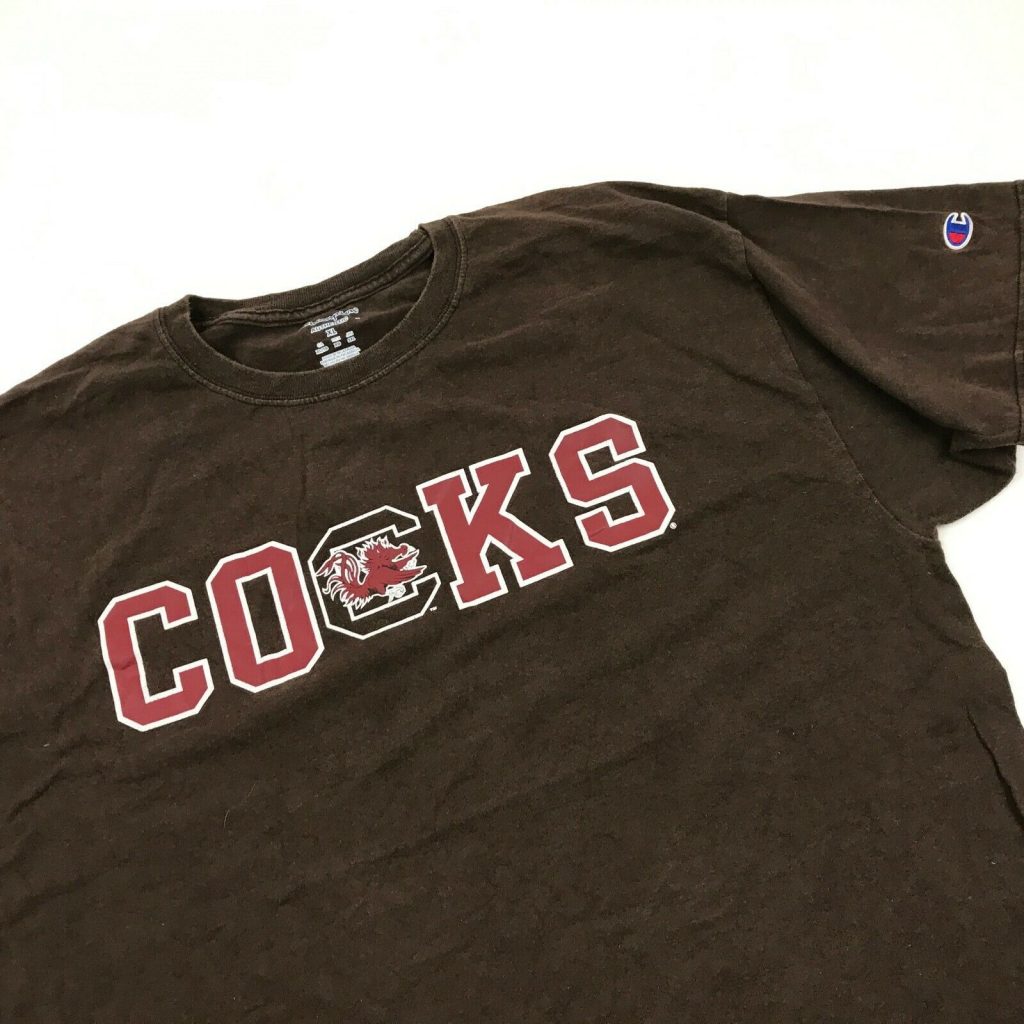My favourite ever t-shirt was my cocks t-shirt.

This is the closest I can find online, but it was nothing like this. My t-shirt was maroon, unadorned apart from the word “COCKS” in huge white letters in that classic blocky angular football font. No logos, nothing to provide any context. It was designed to be worn where its intended meaning was clear.
In 2001 I spent several months working at Amazon’s head office in Seattle. Since I was “nearby”, I visited my friend who was working in Columbia, South Carolina. He took me to a game of the local college basketball team, the South Carolina Gamecocks. Later we visited their merchandise store. I have no interest in basketball or any other sports, and I find the tribalism of it vaguely repulsive. But here was a golden opportunity to take the very straight and repurpose it to be very, very gay. Who says we don’t recruit? I proudly carried that t-shirt back to the UK, where I wore it until it fell apart. Then, I wore it some more.
Even as a relatively junior engineer, one of my responsibilities was to interview candidates. I’m not a complete asshole, I would typically choose a fairly bland t-shirt on an interview day. That morning I simply forgot about the interview. I’d guess less than half of candidates at the time came in wearing an actual suit. This one had an unruly mop of hair, an untrimmed beard, was tall and lanky, and reminded me a great deal of Shaggy from Scooby Doo. The word “suit” could hardly be less appropriate. He’d poured himself into this uncomfortable attire simply to demonstrate his respect for the institution he was hoping to join. I walked in wearing my Russian motorcycle boots, skinny black jeans, maroon “cocks” t-shirt, and the wild nova of bright red hair I was blessed with at the time. We ended up hiring him. And he later enjoyed telling the story, saying that while it was hard to concentrate on the questions, he was encouraged that he’d picked the right place.
Why do computer programmers wear suits to interviews?
I consider myself privileged due to my profession. Perhaps less so these days, but when I started in 1999 computer programmers were very highly in demand, and could pick and choose jobs quite freely. You don’t impose terms and conditions on such employees unless they are strictly necessary, simply because that bids up the salary you have to pay. Every employer takes great care to tuck their coders away in side-offices, far away from where customers may bump into them. That’s because of the things engineers tend to say, not because of what they wear. But having hidden them away, you may as well let them wear whatever they want. That’s where the hoodies and green hair come from.
Thus, my cocks t-shirt was not an anti-establishment queerpunk protest. Really, it was a class marker. It announced to the world not so much that I liked cocks, as it announced to the world that I was confident that I could, in a professional context, announce that I liked cocks, and get away with it.
This interpretation was not lost on me at the time. I believed in social progress, and that in some sense the rising tide would lift all boats. I was still bitter about the formal school uniform, including tie, that my stifling private high school imposed on me. The business suit to me seemed like a rapidly-disappearing relic of an earlier, more conformist age. I saw myself in the vanguard of the new 21st Century world of knowledge work, in which outward displays of originality and creativity only increased your perceived value. The way I saw it, wearing jeans and t-shirt to a customer site was a way to indicate to everyone present that I was a highly-qualified engineer who should be taken seriously. If I turned up in a suit, I’d expect people to see me as the kind of person who needs to wear a suit to be taken seriously. I appreciated that the poor guy in the white shirt or branded polo behind the counter of the mobile phone shop accurately perceived me as an entitled wanker. But I believed that in time he would enjoy the same freedoms I was used to.
I was wrong.
Let’s approach it from a different angle. We can pretty much all agree that if customer data leaks from prowler.co.uk, that’s bad. That’s a gross violation of privacy. Tastes vary, but even if you yourself are not in the market for a Master Series Auto Pounder, you can easily imagine the embarrassment it would cause you if your own purchase of such an item became public knowledge.
But then, why so coy? We live in a world in which pup hoods march up and down their city’s main thoroughfare under the literal banner of their employer’s corporate logos. DEI may be under attack, but large companies still go out of their way to at least label themselves as LGBT-friendly. You can’t realistically work at a corporation and be shocked at the idea that you are sharing an office with men who enjoy anal sex. If you were unlucky enough to suffer a data breach from your Prowler purchase, and were refused employment as a result, you’d win your anti-discrimination case easily. We fought for these things, and we won. Why on earth would we be ashamed of anything now?
I think the key is to consider the modern professional meeting. As an engineer, I’ve sat through a lot of these, in which we discuss the intricate details of API parameter types, and the correct degree of consistency to impose on client applications. Such meetings are, in a nutshell, fucking dull. Your mind wanders. Human minds are exquisitely designed to respond to the needs of an upright East-African plains ape. They are constantly scanning for potential sources of food, hidden dangers, and in our species in particular, the social cues radiated by nearby conspecifics. The threat of an overly restrictive bit-width on a unique identifier parameter leading to incompatibility with a legacy software system is really just not very salient in the Rift Valley, and the mind resists dwelling on such things. Your brain is far more interested in whether anyone else in the room is angry with you, is a potential sex partner, or may be suffering from a contagious disease.
So when the person across the table from you is trying to get across an important technical point, with millions of dollars at risk of misinvestment, it is critically important that you not think about the Deep Invader Tentacle Ovipositor they bought sliding in and out of them depositing eggs. And the only way you could ever possibly not think about that, is if you don’t know. It’s not a question of prejudice. It’s a question of human nature.
As a generalisation, if you pick any three facts about someone at random, such as what they ate for breakfast, all three will be far more naturally interesting than anything relevant to a professional setting. Meetings are almost by definition about the least interesting thing in anyone’s life, because the complex modern economy requires everyone to hyper-specialise until the details of their work are on the far outer limit of comprehensibility. All the easy topics have been covered already. So no professional meeting can be productive if it is polluted by even the most trivial facts about the participants’ private lives.
Hence the imperative for privacy. It is not a relic of a pretentiously prudish, conformist age. It is not about religious judgementalism. It is not inconsistent with an open, tolerant society. On the contrary, it’s a necessary consequence of technological development and the creative knowledge economy. We must all create an elaborate but unrealistic persona to present in our professional lives. Anything that breaks the illusion is profoundly damaging.
So why do computer programmers wear suits to interviews?
The problem is not just details of people’s private lives. In a job interview, neither participant is likely to know anything at all about the other, even taking into account catastrophic data breaches. But the topics in the job interview are even more dull than the usual meeting. They’re dull for the candidate, beyond dull for the interviewer. As a candidate you need your interviewer to concentrate on your answers. So it’s to your advantage to remove even the slightest distraction. That means not wearing distracting clothes. The ideal is to wear exactly the same thing as all the other candidates. And without explicit coordination, the only lowest common denominator is the business suit.
It’s called a “business suit” because it’s what you wear when you need to negotiate with other people, especially people you don’t know intimately. It is a deliberate exercise in stripping away all of your own individuality, in order to leave only the words coming out of your mouth. For computer programmers, doing business is rare, and suits are reserved for special occasions. But for management, business is what they do all day long. So suits are their entire life.

Today the rising tide has not lifted all boats. In fact the tide has gone out, leaving many of us stranded. The social state is being stripped away, wealth is increasingly concentrated. If you find yourself looking for a job, you will need that job more desperately than in previous decades, and you will be in direct competition against more people. There is less scope for individuality and creativity in today’s world than their was at the start of my career. And the business suit is far from being a relic of an earlier era.